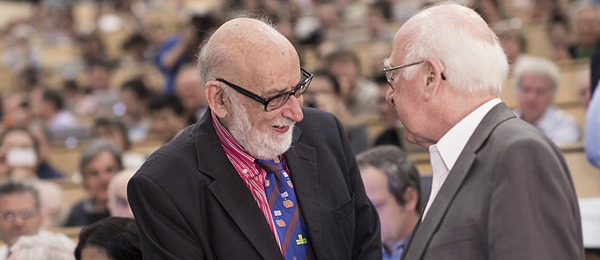Why Nobel prizes do (and don’t) matter

This week saw theoretical physicists Peter Higgs and François Englert awarded the 2013 Nobel Prize in Physics for their 1964 co-discovery with Robert Brout of the mathematics predicting the Higgs boson. The particle was finally definitively discovered earlier this year by scientists working at the Large Hadron Collider at CERN, a 27km-long underground ring that accelerates protons to very nearly the speed of light.
Finding the Higgs is the culmination of fifty years of accelerator physics, which has necessitated the development of ever more ingenious and enormous machines to both accelerate subatomic particles to phenomenal speeds and analyse the fleeting debris that is created when you smash them together. This hunt has forced scientists and engineers to redefine the limits of technology, in areas as diverse as cryogenics, electronics and computing. The resultant, often accidental, innovations have rapidly percolated through society: they have revolutionised medical scanners, and given birth to the World Wide Web and touchscreens. Clearly, the social and economic ramifications of these go far beyond the few-billion-dollar price tag of the research itself.
Some of these serendipitous events might have arisen in different contexts, but other benefits of the Higgs discovery, and fundamental physics more generally, are impossible to reduce to economics. The quest for a deeper understanding of our Universe is one of the ways in which science can enrich culture; like relativity and Schrödinger’s cat, the Higgs boson is now a cultural touchstone.
This Nobel prize also illustrates the capricious nature of scientific immortality: Higgs, Englert and Brout’s ideas were mathematically ingenious whether or not they actually turned out to be an accurate description of nature. Their genius was to develop this theory in the first place, but their good fortune was that, ultimately, reality bore it out. It’s worth remembering that even the smartest scientists and the most elegant theories need a bit of luck too. Science, intellectually and economically, is a high-risk investment with a potentially enormous payoff.
The fact that this prize was only awarded to two individuals (rather than the maximum of three) is a poignant memorial to Robert Brout, Englert’s co-worker, who sadly died just a year before the existence of the Higgs was confirmed. The discovery is also a tale of much wider scientific collaboration and cross-pollination: Higgs, Englert and Brout built on foundations laid by theorists working on an entirely different problem in the physics of materials, that of superconductivity. And other theoreticians were hot on their heels, with several independent rediscoveries of the mathematics following shortly after their landmark paper.
Many of the outputs of science can’t be reduced to neat statistics: from the stories of the scientists themselves to the societies making use of the products of their work, the reason we do science is a combination of humanity’s innate curiosity, and our desire to build a better world. It’s important not to forget why research merits public funding. The Nobel prizes offer a chance to celebrate this human face of science.